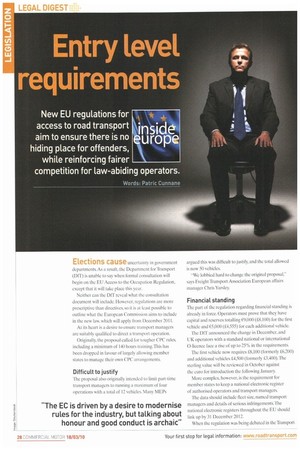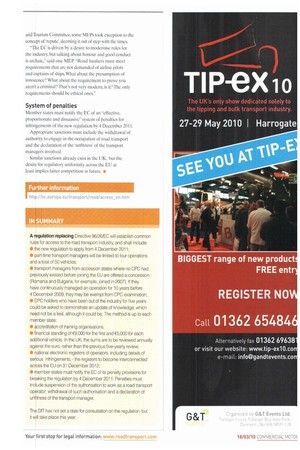Entry level
Page 28

Page 29

If you've noticed an error in this article please click here to report it so we can fix it.
requirements
New EU regulations for access to road transport aim to ensure there is no hiding place for offenders, while reinforcing fairer competition for law-abiding operators.
• inside europe
Words: Patric ConnatiL
Elections cause uncertainty in government departments. As a result, the Department for Transport (DIT) is unable to say when formal consultation will begin on the EU Access to the Occupation Regulation, except that it will take place this year.
Neither can the DfT reveal what the consultation document will include. However, regulations are more prescriptive than directives, so it is at least possible to outline what the European Commission aims to include in the new law, which will apply from December 2011.
At its heart is a desire to ensure transport managers are suitably qualified to direct a transport operation.
Originally, the proposal called for tougher CPC rules, including a minimum of 140 hours training.This has been dropped in favour of largely allowing member states to manage their own CPC arrangements.
Difficult to justify
The proposal also originally intended to limit part-time transport managers to running a maximum of four operations with a total of 12 vehicles !lanv MEPs argued this was difficult to justify. and the total allowed is now 50 vehicles.
''We lobbied hard to change the original proposal," says Freight Transport Association European affairs manager Chris Yarsley.
Financial standing
The part of the regulation regarding financial standing is already in force. Operators must prove that they have capital and reserves totalling €9,000 (t8,100) for the first vehicle and €5,000 (£4.555) for each additional vehicle.
The INF announced the change in December, and UK operators with a standard national or international 0-licence face a rise of up to 25% in the requirements.
The first vehicle now requires £8,100 (formerly £6,200) and additional vehicles £4,500 (formerly +.3,400).The sterling value will be reviewed in October against the curo for introduction the following January.
More complex. however, is the requirement for member states to keep a national electronic register of authorised operators and transport managers.
The data should include fleet size, named transport managers and details of serious infringements.The national electronic registers throughout the EU should link up by 31 December 2012.
When the regulation was being debated in the Transport
and Tourism Committee, some MEPs took exception to the concept of 'repute'. deeming it out of step with the times.
"The EC is driven by a desire to modernise rules for the industry, but talking about honour and good conduct is archaic," said one MEP."Road hauliers must meet requirements that are not demanded of airline pilots and captains of ships. What about the presumption of innocence? What about the requirement to prove you aren't a criminal? That's not very modem, is it? The only requirements should be ethical ones."
System of penalties
Member states must notify the EC of an "effective, proportionate and dissuasive" system of penalties for infringements of the new regulation by 4 December 2011.
Appropriate sanctions must include the withdrawal of authority to engage in the occupation of road transport and the declaration of the 'unfitness' of the transport managers involved.
Similar sanctions already exist in the IJK, but the desire for regulatory uniformity across the EU at least implies fairer competition in future. •




























































































































